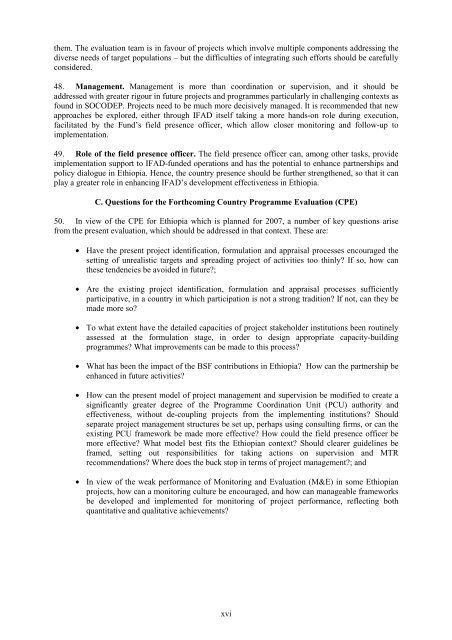Ethiopia SOCODEP CE - main report - IFAD
Ethiopia SOCODEP CE - main report - IFAD
Ethiopia SOCODEP CE - main report - IFAD
Create successful ePaper yourself
Turn your PDF publications into a flip-book with our unique Google optimized e-Paper software.
them. The evaluation team is in favour of projects which involve multiple components addressing the<br />
diverse needs of target populations – but the difficulties of integrating such efforts should be carefully<br />
considered.<br />
48. Management. Management is more than coordination or supervision, and it should be<br />
addressed with greater rigour in future projects and programmes particularly in challenging contexts as<br />
found in <strong>SOCODEP</strong>. Projects need to be much more decisively managed. It is recommended that new<br />
approaches be explored, either through <strong>IFAD</strong> itself taking a more hands-on role during execution,<br />
facilitated by the Fund’s field presence officer, which allow closer monitoring and follow-up to<br />
implementation.<br />
49. Role of the field presence officer. The field presence officer can, among other tasks, provide<br />
implementation support to <strong>IFAD</strong>-funded operations and has the potential to enhance partnerships and<br />
policy dialogue in <strong>Ethiopia</strong>. Hence, the country presence should be further strengthened, so that it can<br />
play a greater role in enhancing <strong>IFAD</strong>’s development effectiveness in <strong>Ethiopia</strong>.<br />
C. Questions for the Forthcoming Country Programme Evaluation (CPE)<br />
50. In view of the CPE for <strong>Ethiopia</strong> which is planned for 2007, a number of key questions arise<br />
from the present evaluation, which should be addressed in that context. These are:<br />
• Have the present project identification, formulation and appraisal processes encouraged the<br />
setting of unrealistic targets and spreading project of activities too thinly? If so, how can<br />
these tendencies be avoided in future?;<br />
• Are the existing project identification, formulation and appraisal processes sufficiently<br />
participative, in a country in which participation is not a strong tradition? If not, can they be<br />
made more so?<br />
• To what extent have the detailed capacities of project stakeholder institutions been routinely<br />
assessed at the formulation stage, in order to design appropriate capacity-building<br />
programmes? What improvements can be made to this process?<br />
• What has been the impact of the BSF contributions in <strong>Ethiopia</strong>? How can the partnership be<br />
enhanced in future activities?<br />
• How can the present model of project management and supervision be modified to create a<br />
significantly greater degree of the Programme Coordination Unit (PCU) authority and<br />
effectiveness, without de-coupling projects from the implementing institutions? Should<br />
separate project management structures be set up, perhaps using consulting firms, or can the<br />
existing PCU framework be made more effective? How could the field presence officer be<br />
more effective? What model best fits the <strong>Ethiopia</strong>n context? Should clearer guidelines be<br />
framed, setting out responsibilities for taking actions on supervision and MTR<br />
recommendations? Where does the buck stop in terms of project management?; and<br />
• In view of the weak performance of Monitoring and Evaluation (M&E) in some <strong>Ethiopia</strong>n<br />
projects, how can a monitoring culture be encouraged, and how can manageable frameworks<br />
be developed and implemented for monitoring of project performance, reflecting both<br />
quantitative and qualitative achievements?<br />
xvi

















